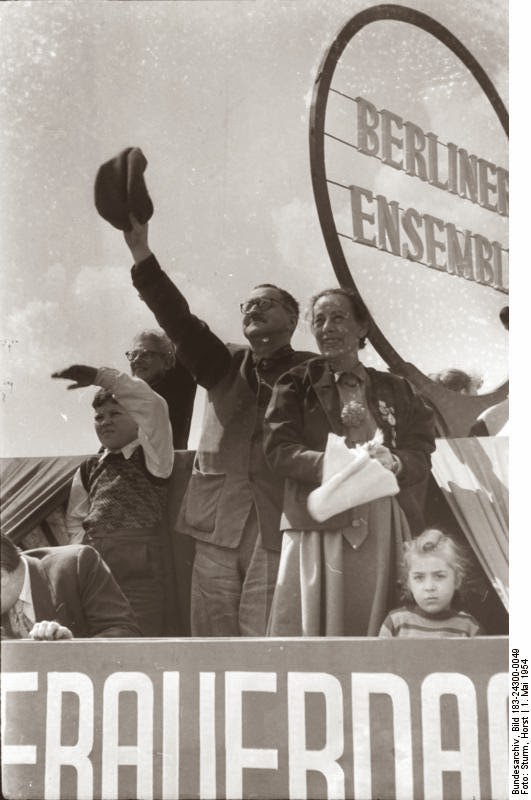We are weeks away from the opening of Signature Theatre's production of Bretolt Brecht's, The Threepenny Opera. To better help ourselves, our cast / crew, and our patrons, we thought it would be useful to explore the man himself and a bit of his biography and the background surrounding the show.
“Art is not a mirror held up to reality but a hammer with which to shape it.” – Bertolt Brecht
Brecht’s Legacy
Bertolt Brecht was a German poet, playwright,
director and political activist known for his theory and contributions to epic theatre. According to Brecht, a
play should first and foremost cause audiences to think intellectually, rather
than only aim to emotionally affect them. Brecht contradicted the popular
theory that theatre should be as lifelike as possible to create a realistic
illusion. Instead, Brecht wanted audiences to be aware that they were viewing a
constructed world so that they could critique the characters onstage while they
were watching instead of being passive observers swept up in the story.
Biography
(An article from www.gradesaver.com/author/bertolt-brecht/)
Bertolt
Brecht was born on February 10, 1898, in the medieval city of Augsburg
Brecht
was a sickly child, having a congenital heart condition and a facial tic. He
suffered a heart attack at the age of twelve but soon recovered and continued
his education.
 |
| A young Brecht. |
Like
most students, he was educated in Latin and the humanities. Brecht was exposed
at a young age to Luther's German translation of the Bible, whose text appears
in many of his plays, particularly Mother
Courage and her Children. While in school he began writing. By age sixteen,
he was writing for a local newspaper and had written his first play, The Bible. By
nineteen, he had left school and started doing clerical work for World War I,
prevented from more active duty due to health problems. After the war, he
resumed his education at the University, intending to study medicine but
becoming more interested in literature and philosophy.
Brecht’s curiosity and exploration extended to his sexual life as well. By the age of sixteen, he began to frequent a brothel as part of a conscientious effort to broaden his experiences. Between sixteen and twenty, he apparently pursued eight girls simultaneously, including Paula Banholzer, the woman who gave birth to his illegitimate child in 1919. He is known to have experimented with homosexuality, often inviting literary and musically inclined male friends to his room on weekends in order for them to read erotic compositions.
In 1917 Brecht enrolled as a medical student at the
Ludwig Maximilian University of Munich, where he would attend Arthur Kutscher's
theatre seminar. Although Kutscher had a reputation as something of a
theatrical guru, Brecht was unimpressed. He went so far as to harshly criticize
one of the instructor's favorite plays, Hanns Johst's The Lonely One, a
biographical drama about the life of nineteenth century dramatist C.D. Grabbe.
The impetuous young Brecht suggested that he himself could write a better play
on the same subject. The result was Brecht's first play, Baal, an effort
that Kutscher considered vile and nauseating.
 |
| Drums in the Night (1922) |
 |
| Helene Weigel |
In 1924, after
receiving productions of The Jungle of Cities at Max Reinhardt's
Deutsches Theater and Edward II at the Prussian State Theatre, Brecht
moved to Berlin
 |
| Brecht and Kurt Weill |
However, even as his
literary fame was soaring, Brecht found his interests shifting towards
politics. In 1927, he had begun to study Karl Marx's Das Kapital, and by
1929 he had embraced Communism. His solidifying political beliefs would soon
become evident in his plays as well. Another Brecht/Weill collaboration, The
Rise and Fall of the City of Mahagonny, caused an uproar when it premiered
in Leipzig
In February 1933, Bertolt Brecht's career was
suddenly and violently interrupted as the Nazis came to power in Germany Prague Germany
The exiled dramatist bounced around from Prague to Vienna to Zurich to the island
of Fyn to Finland United States U.S.
visa and relocated to Santa Monica ,
California
 |
Brecht before the
House of
Un-American
Activities
|
Unfortunately, Brecht's stay in America Switzerland , not even waiting to see the opening
of his play Galileo in New
York
 |
| Brecht and Weigel on the roof of the Berliner Ensemble |
On October 22, 1948, after 15 years of exile,
Bertolt Brecht returned to Germany ,
settling in East Berlin where he was welcomed
by the Communist cultural establishment and immediately given facilities to
direct Mother Courage at the Deutsches Theater. The following year he founded his own company, the Berliner Ensemble, and in 1954 he was rewarded with his own theatre--the Theater am Schiffbauerdamm. Brecht quickly discovered, however, that the German Democratic Republic was not quite his ideal brand of Communism, and he was often at odds with his East German hosts.
 |
| Brecht |
Brecht wrote very few plays in his last years in
Berlin, none of them as famous as his previous works, although he did make some
attempts at a play following the careers of Einstein and J. Robert Oppenheimer,
and he was said to be contemplating a play in response to Samuel Beckett's Waiting
for Godot at the time of his death. In addition, he wrote some of his most
famous poems during these last years, including the "Buckower
Elegies."
In 1955, Brecht received the Stalin Peace Prize.
The following year, he contracted a lung inflammation and died of a coronary
thrombosis (heart attack) on August 14, 1956.
Bretolt Brecht's The Threepenny Opera runs from April 22nd - June 1st at Signature Theatre. Call 703 820 9771 for tickets and showtime information.













